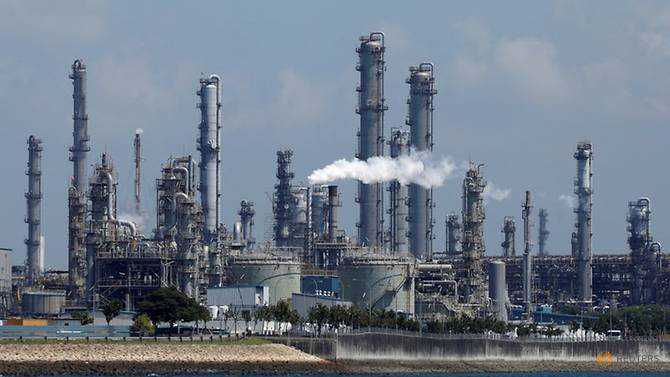Shell Singapore to repurpose core business, downsize Pulau Bukom refinery in low-carbon shift
11 November, 2020

Shell Singapore said on Tuesday (Nov 10) that it plans to repurpose its core business and halve its crude processing capacity at its Pulau Bukom oil refinery, within an overhaul in its journey towards a low-carbon future.
Within the transition, Shell will cut 500 jobs by the finish of 2023 at the Pulau Bukom site, which now employs 1,300 staff, a Shell spokesperson told CNA.Shell outlined its path of transformation in Singapore under a 10-year plan on Tuesday that will see it, among other things, try to expand its solar footprint and network of electric vehicle charging options.
Shell said it was studying the production of products that could still be viable after its energy transition, such as for example biofuels and specialities like bitumen. Additionally it is looking at using different raw materials, or feedstocks, such as recycled chemicals.
"Today, our extensive occurrence in Singapore’s energy sector carries with it a carbon footprint," said Ms Aw Kah Peng, chairman of Shell Companies in Singapore.
"Our businesses in Singapore must evolve and transform, and we should act now if we are to attain our ambition to thrive through the energy transition. Our decisive action today can help Shell in Singapore stay resilient and create a cleaner, more sustainable future for all those," she added.
Shell's business review in Singapore follows a pledge by parent company Royal Dutch Shell to become carbon neutral by 2050, matching a commitment by rival BP as climate change looms large over the energy sector.
The business said it planned to have net zero emissions from the manufacture of most its products by 2050 "at the most recent".
The goal is also consistent with Singapore's ambition to halve its 2030 peak greenhouse gas emissions by 2050, also to achieve net zero emissions "when viable" in the next half of the century.
DOWNSIZING PULAU BUKOM OPERATIONS
Within its plans, Shell will reduce the crude processing capacity at Pulau Bukom - its largest refinery - to 250,000 barrels of oil per day from the current 500,000.
The move brings the full total refining capacity cuts by Shell lately to 571,000 barrels per day, or maybe over a fifth of its capacity globally.
Pulau Bukom will be one of six oil refining and petrochemical sites Shell will keep, down from the existing 14.
"Bukom will pivot from a crude-oil, fuels-based product slate towards new, low-carbon value chains," said Shell Singapore in a news release.
"We will reduce our crude processing capacity by about 50 % and aim to deliver a significant decrease in CO2 emissions," it added.
To take action, however, will also have a corresponding influence on Shell's manpower.
"As Bukom transforms and becomes smaller and smarter, the resizing of procedures will bring about fewer jobs but more very skilled jobs as digitalisation and automation progress," the company said.
Shell plans to lessen its staff strength at the website to at least one 1,100 by the end of 2021 and 800 by 2023, a spokesperson told CNA. It currently employs 1,300 staff at the website.
The transition may happen over the next 3 years and the initial staff movement linked to the reorganisation will only be in the fourth quarter of next year.
In September, its parent company said it planned to break up to 9,000 jobs globally, or even more than 10 per cent of its workforce.
“Singapore is an integral hub for Shell. These decisions show how determined we are to stay a part of Singapore’s energy future, just as we've been partners in financial development over the decades,” said Mr Huibert Vigeveno, downstream director and person in the executive committee of Shell.
“The transformation of our business in Singapore, and specifically our major refinery on Pulau Bukom into among our approximately six energy and chemicals parks, is vital to Shell's ambition of becoming a net-zero emission energy business by 2050 or sooner, in step with society and our customers.”
PILLARS OF SHELL'S BUSINESS TRANSFORMATION
In Singapore, said Shell, it aims to cut its carbon emissions by in regards to a third within a decade.
This transition will be accelerated through three pillars:
First, the company plans to repurpose its core by focusing its manufacturing assets to supply more energy transition resilient products.
Second, in addition, it plans to provide low-carbon solutions because of its customers in the next sectors - power, mobility, shipping, aviation and trading.
Third, it will partner with key stakeholders to "bring about sustainable change".
Apart from plans to expand its solar footprint and network of electric vehicle charging options, Shell Singapore's LNG bunkering joint venture, FueLNG, will also scale up with the arrival of Singapore’s first bunkering vessel in late 2020.
Shell Singapore may also use customers in Singapore to provide carbon neutral solutions, as well as the National Environment Agency on a joint feasibility study for the set-up of waste segregation facilities and plastic pyrolysis plants to recycle Singapore’s plastic waste.
Source: www.channelnewsasia.com
TAG(s):
